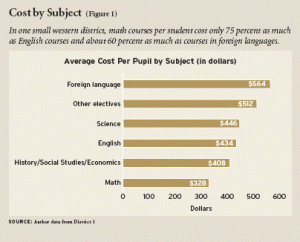As I’ve said before, when schools suffer budget cuts, music and the arts are usually the first to go. These classes are viewed as much less important than the typical academic classes, but in my last post I outlined reasons why music ed can be very beneficial to students in many ways. However, music ed doesn’t cost as much as one may think.
Music programs do need to buy materials, just like when conventional classes buy text books, equipment for experiments, etc. In the case of a music program, teachers will usually buy school instruments for those students who play a large instrument like a tuba, euphonium, percussion, string bass, or cello. These school instruments will last a long time if you take good care of them. Other than those, students are required to either rent or buy their own instrument. Often times music stores sell quality, used instruments at pretty low prices so that students can afford them. In addition, band and orchestra teachers buy music stands, but those are also a one time cost. Obviously, after many, many years they might need to get more music stands, but they do last a pretty long time. Another cost is the that of sheet music. Chorus programs only need sheet music and no instruments, so that’s pretty simple. In elementary band and orchestra, students are usually asked to buy their own methods books that cost about $10, but they use those for two years. From then on, pretty much all music is lent out for the students to use for the year, and they return it at the end of the year. Elementary teachers are even starting to do that with their methods books in order to cut out that cost. Obviously, it’s very important that students take care of these materials so that they last longer. For high school, that definitely happens more easily than with younger kids, but you would be surprised how willing young kids are to take care of their materials when you tell them that it’s very important.
All of these costs add up and amount to roughly $187 per student per year, which really isn’t that much. To put it into perspective, here’s a chart that represents the costs of other subjects:

As you can see, music ed really isn’t all that expensive in comparison to other subjects.
I know that not matter what, there will still be cuts in education funding. Unfortunately it’s something we just have to deal with. In my opinion, it’s extremely important to cut funding to every aspect of the school. To an extent, it’s hard to do that because sometimes money is donated specifically for a certain area, so there isn’t anything we can do to change that. But I don’t think that any one subject area should be cut completely to make up for the budget deficits. I’m not going to go into all of the ways that money can be saved in schools, but there are definitely simple ways to save. For example, in my school district, they leave the computers on all summer. If they were to turn them off for the summer and then start turning them on it groups a few weeks before school begins again, they could save so much money on electricity. This is just one example of silly ways that schools waste money. If we fix these little things, then cuts wouldn’t have to be made as much to every subject, not just the arts.
I know it would be fair to make cuts to all subjects, but people usually believe that music and art education are not as important as the core subjects, so they should receive the most of the budget cuts. However, if you refer to my last post, I outlined a lot of reasons that music education can be so important to the development of young children. These benefits are so great, that even the president of Cornell University commented on it: “Training in the arts prepares a growing child just as well for a scientific or technical career as [does] training in STEM subjects, if not better.” One way that this can be exemplified is that training on a piano can actually help students in math. After all, intervals between notes are just numbers, and a piano presents a very good visual for that. Overall, music education really isn’t all that expensive, and it’s possible to include it by making sure that budget cuts are even among all students. Additionally, there are many reasons that people should want to save music education because it can be extremely beneficial to their children.
Sources:
http://www.takepart.com/article/2012/08/30/music-education-why-does-not-have-expensive-why-should-stay-schools
http://educationnext.org/breaking-down-school-budgets-2/
http://www.artsjournal.com/slippeddisc/2014/01/cornell-president-young-scientists-must-be-taught-the-arts.html
I agree that music does not always cost as much as one may think. As I outlined in my post, though, funding cuts can be get to the point that a decision must be made between art/music and other core subjects. If we take funding from all subjects than they will all suffer, but if we just remove art funding other subjects can be maintained. I personally support the arts, but in drastic cases I think that art and music could reasonably be cut.